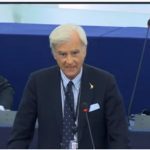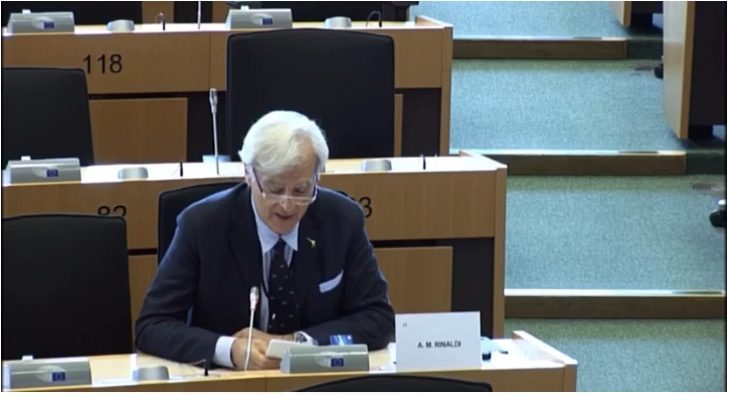Antonio Maria Rinaldi in the Marche. An economic analysis full of realism, but also a desire to fight (by Marco Minossi)


Antonio Maria Rinaldi, MEP of the League, makes yet another stop in the Marches, spreading awareness and passion on the problems and unknowns that inhabit us these days, in the region and in the country.
First of all he is keen to make a clarification: "sovereignists" yes, but as we all are on the basis of Article 1 of the Constitution, which establishes in indelible terms that "sovereignty belongs to the people".
Let us not fall into the trap of exploiting both concepts, sovereignty and people, into "sovereignty" and "populism" for the benefit of those who want to delegate the exercise of our democracy to other and supranational institutions, moreover not elected except the European Parliament, certainly not the institution – therefore – endowed with the greatest powers.
Also because, in moments of greatest difficulty or emergency, the European Union has shown that it does not exist, and individual states have intervened. Good for those who, such as an Italian pizza chef residing and working in Belgium, have been able to stop their suffering with a minimum bureaucracy that has credited their current account with three thousand euros three days after the (streamlined) request. We keep in mind that Belgium is not doing exactly well from a financial point of view, penalized as it is by public debt at “Italian” levels. In the other countries too, the states have given substantial and immediate non-repayable resources, in Italy in a cumbersome way and on loan.
The activity of the European Parliament is also that of monitoring the decisions taken by the Commission. For example, it was Rinaldi himself, on 23 July last, who warned that the attitude of the so-called "frugal" countries (a term that is not well known what it means, he observes) was not okay; "that they do not want many, besides the interests own and of Germany ", we allow ourselves to integrate here) with respect to the financial resources to be assigned to Italy.
Berlin sends these satellite nations to the fore in expressing opposition, and then in exchange for them to recognize rebates (rebates on invoices) on European contributions to be paid by Brussels.
In the last 20 years Italy – he pointed out on that recent occasion – has paid 160 billion euros into the coffers of the union, divided as follows: 102 billion as the difference between giving and receiving back (the condition of "net taxpayer" ); moreover, for assistance to countries in financial difficulty, that is, for the various funds such as MES and SURE to name the most famous, we have paid 58 billion in the last 20 years, for an overall liability position of 160 billion euros.
Thinking that active taxpayers, that is, those who receive more than they pay, are those who activate more attractive tax policies, in contrast and in clear non-homogeneity with what is in force in the EU, and exercise such vetoes, means assuming an incorrect and harmful attitude, and it is certainly not Italy that can and should pay the price, nor that it is the object of moral appeals.
It is not fair that the second industrial country of the Union, as well as the third net contributor, always goes to Brussels on its knees and hat in hand to beg, it is time to change its attitude.
It should be noted, in our opinion and barring any oversights or distractions, how this fundamental intervention for our country has never been correctly reported by the mass media, overshadowed by ballets and tugs between the Nordic and Conte and Gualtieri , who took advantage of it to appear themselves as staunch defenders of Italian interests.
Constructive criticism and anti-Europeanism have been pointed out by Rinaldi to be two completely different things, therefore. Exercising the first is the reason why your compatriots vote for you, which for him happened right in the college of the Marche, this report has therefore gratified and reassured his constituents present on the occasion and in the venue to which we are referring, Porto Sant'Elpidio on 29 August.
Mario Draghi himself at the Rimini meeting admitted that it is right and legitimate to challenge these European rules, but here too we are talking about the part of his speech which was given little or no prominence, we need to read carefully between the lines of the text to notice.
And then, the passage on the Recovery Fund could not be missed: Rinaldi "is in the middle", being part of the ECON Commission, and unfortunately can assure that before concrete funds arrive it will be a long time; yes, precisely those resources that the real Italian economy would need not from tomorrow morning, but "from yesterday". There is thus a risk of killing the Italian economy itself, which is not made up of multinationals (which will have easy access to Recovery resources), but of small businesses, small businesses, the activities that have made our country so great, and which are destined to die (how many will close in October-November?), except for the efforts that the party he represents is making.
So be careful not to create easy expectations, which will be disregarded, and which will in any case be debt to be repaid and conditions to be respected, and on which to be strictly controlled (Rinaldi uses the famous term "conditionality" to facilitate immediate understanding, we allow ourselves to insist that it is an artfully studied political lexical complication, and does not exist in the Italian language, which only includes the word "conditions").
The counter-proof of what will be the delays of this rescue plan is the fact that the President of the ECB Christine Lagarde has set up a " Quantitative Easing Pandemic" for 1,350 billion in one year: what need would have been such availability to underwrite government bonds, in the event that the recovery share had really arrived? And what real need does the Italian government have for this instrument and for the ESM, when BTP auctions continue to have demand far greater than supply?
We also consider it appropriate to add a small "load of trump cards", in this last regard: Italian citizens are aware of the fact that, in the event that the State must find itself in a cash situation such as to be able to repay only a tranche of securities maturing with savers and institutional investors, OR a tranche of the debt with the EU from Recovery and / or MES, would be obliged to prefer the latter as a privileged credit for the issuer, and if it did not would his initiative be condemned to do so by a foreign court, with further interests and sanctions, and therefore with additional limitations to our democracy?
Regardless of political beliefs, no one can deny that Antonio Maria Rinaldi is a winning mix, as convincing, of professional economic competence and passion for the Italian interest. As we write, he has already returned to Brussels where he works assiduously, as he believes that the commitment to those who have trusted him is above all that of working.
Marco Minossi

Thanks to our Telegram channel you can stay updated on the publication of new articles of Economic Scenarios.
The article Antonio Maria Rinaldi in the Marche. An economic analysis full of realism, but also the desire to fight (by Marco Minossi) comes from ScenariEconomici.it .
This is a machine translation of a post published on Scenari Economici at the URL https://scenarieconomici.it/antonio-maria-rinaldi-nelle-marche-unanalisi-sulla-situazione-economica-piena-di-realismo-ma-anche-di-voglia-di-battersi-di-marco-minossi/ on Sun, 30 Aug 2020 14:11:25 +0000.
